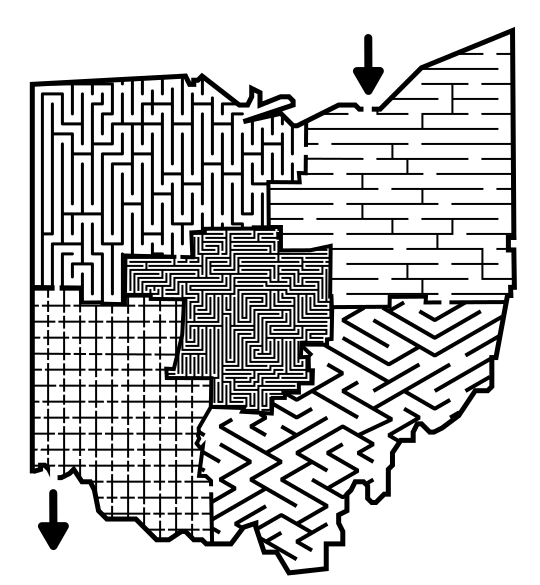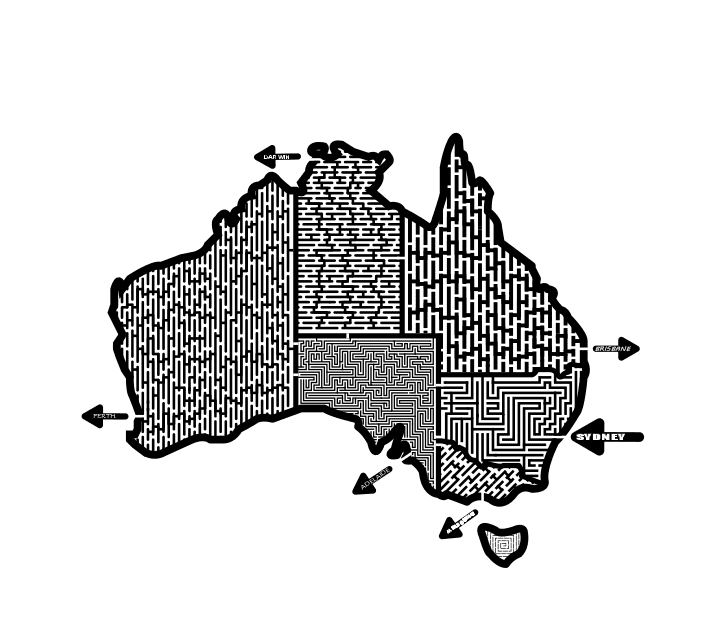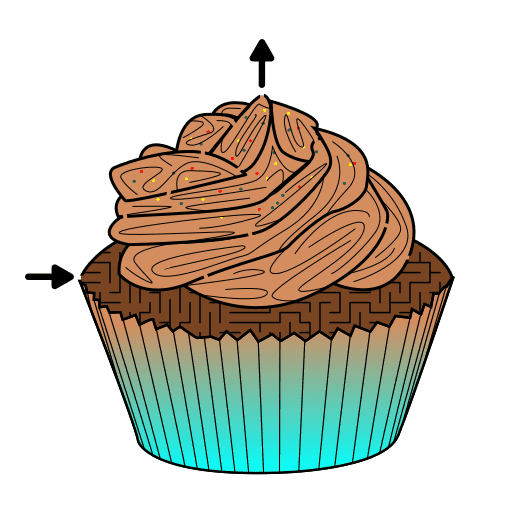In a series of posts I will show you how to make a maze in a wide variety of design constructions. The 22nd type of maze construction is the Mixed Section maze. Let’s define what I mean, then get into the example. Every example will use the sample basic outline (the state of Ohio) to better illustrate the differences between each maze type.
Mixed Section Maze - A maze that uses many different design constructions to sepArate different sections of the maze. This construction works well for objects that have many different parts.
HOW TO MAKE A MIXED SECTION MAZE
Step 1 - Draw the Outline
The outline of the maze makes the outer wall of the maze. It can be anything from a simple shape like a square, to a complex picture. The outline should be thicker than the internal lines to give the maze definition. In the example below I chose the state of Ohio.
Step 1.5 - Choose the Start and Goal
For the below example I chose the start of Cleveland and the goal of Cincinnati.
Step 2 - Draw the Sections
Draw the outline of the sections. For this example I used the sections of Ohio. In some cases the drawing of the object you are making of maze of will already have sections naturally. This is a map that shows the five sections of the state of Ohio. A natural place to use this type of maze is with maps, like a country broken into the different states.
Step 3 - Maze the First Section
Mixed mazes use many different path and construction types. Choose a wall type and construction and maze the section closest to the entrance. Different construction types will create different flow within a maze. This particular maze does not naturally call for darker/lighter, heavier/lighter, vertical/horizontal for any particular section, but some mazes will.
Step 4 - Maze Each Additional Section
Draw walls one section at a time. Section 2 example below. Both are standard maze constructions but with different spacing. NE is horizontal and NW is vertical.
The third section is a small Standard Equal Path Maze. This appears much darker.
The fourth section is an Axonometric Maze.
Step 5 - Complete the Maze
Draw all sections of the maze to complete the maze. The fifth an final section in the example below is a Grid Maze. Each section has a unique look.
Step 6 - Make the Maze Solution
Highlight the correct path in the final version of the maze to create the final Maze solution (shown here in red).
Additional Mixed Section Maze Examples
More important than HOW to make this maze type is WHEN you might want to use it. When you are making a maze of something that has distinct sections. Or when something has a single color but different textures/sections and you want to help differentiate between them.
This Vanilla Ice Cream Cone maze is a great example of a mixed section maze. Everyone can understand what the “handle” of a cone looks like and this 45 degree shifted standard equal construction tries to duplicate it. The larger spacing of the ice cream portion lets the vanilla color come thru !
Another example of a mixed section maze is this maze of Australia that splits the country by state. This is also an example of a multi-goal maze with one entrance (Sydney) and 5 possible exits. The mixed sections make the states easier to see vs. only having one maze type.
My third example is this Chocolate Cupcake Maze which uses a small standard maze on the cupcake portion, below the free drawn maze drawn on the topping.
My last example is a Pancake Maze that features a lot of unique aspects. First it is a mixed section maze. The syrup portion of the maze is free drawn to flow naturally with the way syrup would, while the pancakes use a standard maze construction. I also like this maze because I made the syrup semi-transparent.
Interested in learning how to make or draw other types of digital mazes ? I have step by step instructions on how to make over 40 different maze types.
If you prefer making labyrinths, you can find step by step labyrinth making instructions.












